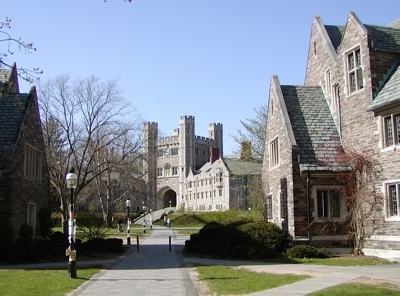Home | Beginning the Process | Prepare as an Undergraduate | Choosing a Graduate Program | Early Graduate Life | International Students
Choosing a Program
Finding a Graduate Program
As you begin to think that attending graduate school in the chemical sciences is appropriate for you, you enter the second phase of planning for graduate work in the chemical sciences. By using your career goals to guide the process of exploring, applying for, and visiting graduate programs, you position yourself to make the most of the time and effort you will be investing in your graduate work.
Carefully consider your goals. Take the time to consider different areas of science, places of employment, and types of work. Where do you see yourself having a successful and satisfying career?
Honestly assess your skills and knowledge. Consider how they have been developed by your experiences and what needs to be enhanced. Are you ready to pursue a graduate degree?
Consider how the nature, resources, and track records of graduate programs align with your professional goals and needs, as well as your personal situation. Will they help you develop the knowledge and skills you need? Provide the financial and socio-emotional support you need?
Each step of this phase gives you the chance to further develop your reasons for pursuing a graduate degree:
Exploring Options
As you consider potential graduate programs, look for several that will help you pursue your career goals. This is a process that will take time, investigation, and reflection. Many undergraduate students spend their junior year exploring options for graduate school, so they are ready to focus on the application process at the start of their senior year.
Graduate school fairs and websites can provide initial introductions to the benefits and expectations of different graduate programs. You can also contact graduate admissions offices with more detailed questions.
Communicating with individual faculty members whose research interests may match yours will also help you understand the benefits and expectations of graduate programs. Be sure to visit their web pages as well.
Many institutions, departments, and research groups are using social media. Visiting LinkedIn and Facebook groups, watching videos, reading blogs, and following Twitter feeds can give you a sense of what is currently happening.
Your choice of graduate program will depend on your career goals and many other factors. Input from a range of people and resources will help you make informed decisions that reflect your goals and needs.
Questions to consider throughout the process of exploring, applying for, and visiting graduate programs...
Nature of the program
- Does the department offer a degree appropriate for your career goals?
- Are there admission requirements?
- What are the degree requirements and how does this program guide you toward completion of the requirements? Is professional development tracked using Individual Development Plans (IDPs)?
- Does the department offer a sufficiently large and varied curriculum with courses and options consistent with your career goals?
- Are there opportunities to gain knowledge in areas outside of chemistry, such as engineering or biology?
- Does the department provide training in non-technical skills such as teaching, communicating orally and in writing, developing grant proposals, entrepreneurship, ethics, safety, and intellectual property?
- What is the demographic make-up of students in the department (e.g. male/female, domestic/international)?
Resources
- Are the libraries, laboratories, IT infrastructure, and other research facilities adequate for your educational needs?
- On average, what percentage of students is supported by teaching assistantships? Research assistantships?
- What financial support is available? Does it include tuition, summer support, and health insurance? Will it be sufficient to support you and your family?
- Are other benefits, such as child care, available?
Track Record of the Program
- To what extent are the faculty attracting graduate students, publishing, and obtaining research grants?
- Where are recent graduates employed?
- What is the usual time for completion of degrees?
Potential Advisers
- Does the program have several faculty members who you would like as advisers?
- How are advisers assigned?
- Are potential advisers likely to have a place in their research group for you?
Preparing Competitive Applications
Your exploration of options for graduate school should help you identify several programs that are aligned with your career goals and needs. A strategy for applications might be two submissions at highly competitive institutions and two or three others which are a good match with your abilities and interests. During the fall of your senior year, about 10-12 months before you expect to start graduate school, determine the requirements for admission to each of these programs.
Most programs have admissions and/or financial aid deadlines in December. Most institutions charge an application fee of $50-100. Fee waivers are sometimes possible.
By applying early, you convey your interest and level of commitment. If scholarships and awards are given on a first-come, first-served basis, an early application may work in your favor.
Many departments start to consider graduate school applications during the fall semester. Most try to be finished with their decisions by mid-winter or early spring.
Admissions committees will be assessing your ability to do high quality graduate work. Your application should convey your talents and goals, along with your area of interest and your preparation to pursue that field of study. Being able to say why you want to pursue a graduate degree and what you hope to gain from the experience will help you find an appropriate program and be a competitive applicant.
Your Undergraduate Record
Most graduate programs consider grade point averages (GPA) in the range of 3.0-4.0 and some concentrate on GPAs greater than 3.5. Having a distinguished undergraduate record will enhance your chances for admission. If you will graduate with less impressive grades, keep in mind that motivation and creativity will also go a long way toward a successful application. Your letters of recommendation and other parts of your application can highlight experiences (such as undergraduate research or internships) that make you a strong candidate. Peer-reviewed publications, presentations at state, regional, and national science conferences, and teaching experiences (e.g. lab proctoring, tutoring) also enhance your application.
Letters of Recommendation
Admissions committees are looking for letters of recommendation from science faculty and advisers who are familiar with your work both in and outside of the classroom, as well as the expectations of graduate programs. Usually at least three letters are required. They should:
- Describe a well-rounded background
- Convey how your goals, knowledge, skills, and abilities are aligned with the graduate program
- Demonstrate your passion for and commitment to pursuing a graduate degree
Graduate programs with research requirements would like to have letters from faculty you have worked with during undergraduate research programs. Graduate programs seeking to prepare students for industry would like to have letters from those in a chemistry-related business where you had an internship or summer position. Faculty who have been particularly impressed with your critical thinking skills or your writing ability are also good choices from whom to request a letter of recommendation.
Tip

Most graduate programs expect a response from successful applicants by mid-April. After you make your decision, be sure to inform all of the institutions which have made offers.
Essays
If a graduate program requires submission of an essay or statement of purpose, take it seriously.
To write a good essay, you must:
- Take time with your writing. Although this is not an English assignment, spelling and grammar count.
- Think creatively. What are your strongest assets and how do they fit with your goals for a graduate education?
- Ask someone familiar with the graduate admissions process to review your application before you submit it.
Essays that reflect the program to which you are applying and your area of interest will be particularly compelling.
Exams
Although you may not have the scores until after you submit your applications, graduate programs may require you to take one or more exams:
- Graduate Record Exams
- General – verbal
- General – quantitative
- Chemistry
- Language exams (if English is not your first language)
Tip
When you're ready to submit your application, double-check to be sure that you have included all the materials required, and submit it by the deadline!
Taking Exams

Review the specific test requirements for the universities to which you are applying. Graduate programs often require applicants to demonstrate their level of knowledge by taking the Graduate Record Exam (GRE). International applicants may need to take language tests.
Check with graduate programs to determine their deadlines for exam scores, which may be after the application deadline. In most cases, required exams are taken before the end of December of the senior year so that the results will be available by the following February.
Graduate Record Exams
The Graduate Record Exam (GRE) is a common requirement for admission to graduate programs in the chemical sciences. In most cases the verbal and quantitative reasoning scores of the revised general test are required. Some institutions also require the chemistry subject area examination.
To register, you will need to create a GRE account. The general GRE exam is offered in both electronic and paper form, but the latter is offered only in very few places and less frequently. The subject tests are given at paper-based test centers in September, October, and April.
When you take the exams, be sure to request to have score reports sent to the graduate programs to which you applied. Informal scores are sometimes available at the exam site, but official scores are mailed approximately six weeks after the test date
Learn more about the GRE
Register, find locations, and take test prep courses.
Reduce your GRE Registration Fee
A Fee Reduction Program is available for individuals who demonstrate financial need and for national programs in the United States that work with underrepresented groups.
Language Exams
For students who speak English as a second language, most institutions require the Test of English as a Foreign Language (TOEFL) or the International English Language Testing System (IELTS). You must achieve a minimum score on the TOEFL Internet-based Test (TOEFL iBT) or the International English Language Testing System (IELTS) to be eligible for graduate teaching assistantships.
Tip
Take these exams during the summer prior to your senior so that you have time to re-take them if necessary.
Visiting Prospective Programs
Graduate school visits can provide invaluable insights into your consideration of graduate programs. During your visits you will have the opportunity to learn about the nature of the program, the resources it provides, its track record, and potential advisers in person and in much more detail. (see “Exploring Options”). Visits help assess important differences in educational, cultural, and socio-economic environments. Are you going to enjoy and learn from your graduate school experience?
Contact departments in advance regarding your plans so they can arrange appointments for you to meet with faculty and graduate students in your areas of interest. Many graduate programs will help arrange and cover costs of visits for students they have accepted. Some departments prefer to host prospective students individually, while others host organized events to which they invite selected students interested in graduate work at their institution. Most departments are flexible and will accommodate any special requirements that you may have. Be sure to communicate with programs if your plans change for any reason.
Tip
Many institutions are prepared to assist you in financing site visits. Try to incorporate several visits in one trip.
Paying for Graduate School
Funds to support your graduate education may be obtained from a number of sources and are often sufficient to cover living expenses and tuition without taking loans or going into debt. Fellowships, teaching assistantships, and research assistantships generally include tuition waivers or allowances, as well as a stipend that is usually sufficient to support a healthy lifestyle.
The ways in which graduate programs provide financial support varies. It also is likely to change over the time you spend in graduate school.
You should pay attention to the financial details of offers extended to you. Some departments provide financial assistance only during the academic year, while others provide support for a full calendar year. It is the bottom line that is important: your stipend, minus the fees that will be counted against the stipend—either directly or indirectly—such as tuition, health care, state and local tax (if any), cost of living, housing, etc.
Stipends
Graduate stipends allow you to be paid for doing something interesting, but they must also help you to reach your own goals. You may need to pay taxes on your full stipend.
Fellowships
Since many fellowships are competitive, obtaining one can enhance your resume.
You will find tremendous variation among the level and timing of the support provided by graduate fellowships. Some, such as those supported by the National Science Foundation, provide full support for multiple years. Other fellowships may partially support graduate students for specific times, such as writing thesis, or activities, such as travel to present at conferences.
ACS Fellowships
- ACS Grants, Funding and Awards
Visit our Graduate Grants, Fellowship and Awards page to find something that may be useful for you.
National Fellowships
- National Science Foundation (NSF) Graduate Research Fellowship Program
- National Defense Science & Engineering Graduate Fellowship
- National Institute of Health (NIH) National Research Service Awards
- Department of Energy (DOE) Fellowships
- Ford Foundation Fellowship Program
- National Aeronautics and Space Administration (NASA) Graduate Student Researchers Project
- National Research Council (NRC) Research Associateship Programs
Graduate Teaching Assistantships
In U.S. universities, many laboratory and recitation sections, as well as some courses, are taught by graduate students. The financial support they receive for doing so is called a Graduate Teaching Assistantship. Also called Teaching Assistantships or Instructional Assistantships, such support is commonly offered to students during the first year or two of graduate school.
Serving as a Graduate Teaching Assistant (GTA) will give you opportunities to:
- Gain valuable management experience
- Work with undergraduate students
- Exercise your knowledge and understanding of chemistry
- Associate with experienced instructors as well as other graduate students learning to teach
Given the responsibilities associated with instructing others effectively and safely, GTAs are required to attend training sessions and, in some programs, demonstrate their proficiency.
While serving as GTAs, graduate students must balance their instructional responsibilities with other activities required for their degree.
Tip

Considering Going Early to do Summer Research?
If you have the opportunity to do research with a faculty member prior to starting a graduate program, it will allow you to get acquainted with your new department and explore an area of research. You are under no obligation to select your summer research adviser as your graduate adviser.



